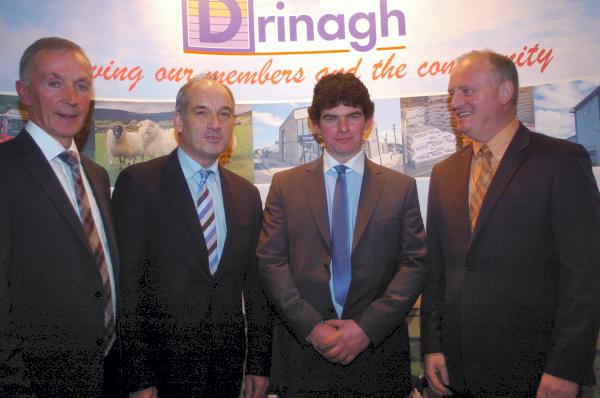Turnover at Drinagh co-op surpassed the €100m mark for the first time, reaching €119.1m, an increase of 23% on 2012.
Operating profits at Drinagh doubled to €1.99m, and when the co-op’s share of Carbery’s profits (€5.55m) is taken into account, operating profits increased by 47% to €7.7m.
Drinagh’s core milk and creamery business recorded a 25% increase in turnover to €59.6m. While milk deliveries increased 5% during the year to 144.8m litres, strength in international markets helped drive the price growth.
According to the Irish Farmers Journal/KPMG milk price review, Drinagh paid the third-highest milk price in the country at 39.10c/L in 2013.
Mill output was up 17%, while fertilizer volume was up over 30%, driven by the unprecedented weather of last spring. Drinagh core milk, feed and stores business accounts for just over a quarter (26%) of total profits. Its stake in Carbery accounts for about 72% of total profits. (See figure 1).
Net debt at year end was €9.8m, an increase €1.44m. Chief executive Joe O’Sullivan said that the increase was mainly due to increased working capital.
Drinagh has relatively low gearing, with the majority of its bank debt relating to one foreign property investment in Germany. This is non-recourse to the co-op and according to Joe O Sullivan, the rental income is secure and covers the associated loan repayments.
Store sales were up 20% on 2012 to €38.1m, driven in the main by the effects of the Biggs acquisition. He says the integration of the Biggs business is going well, with duplication removed and cost savings in place.
The society invested €2m in Carbery’s equity instrument which will provide an annual 6.5% tax free dividend from 2014.
The total trade bonuses, made up of milk, feed and fertiliser amounted to €2.3m, which represented an increase of €574,000 or 33% on 2012.
A bonus of 0.70 cents per litre based on milk supplied was paid. This was in addition to a 0.50c bonus paid by Carbery to Drinagh.
On milk price, he says that “at current prices it is causing a supplier response around the world and will exceed consumption which is bound to affect price unless there is some significant event”.
He cautions that farmers should be aware of the expected volatility and to budget for it.
O’Sullivan sees access to land the greatest challenge to farmers in west Cork, where any land suitable is already in dairying.






 This is a subscriber-only article
This is a subscriber-only article











SHARING OPTIONS: